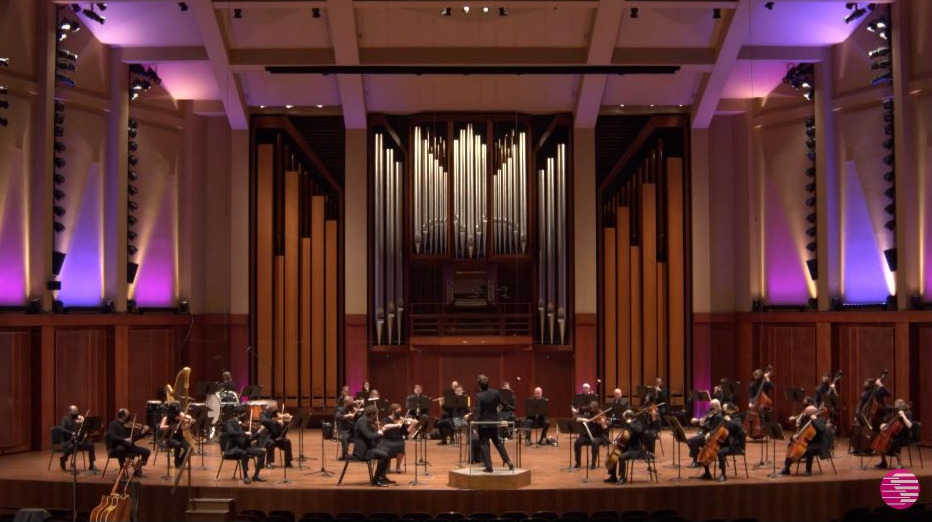
On Saturday last, the Seattle Symphony’s long-awaited return to live music-making was streamed from Benaroya Hall. There were 35 spaced musicians on the stage and nobody in the audience. Music-lovers who didn’t avail themselves of the opportunity to watch and listen to the event in real time should take advantage of the Orchestra’s new streaming website to experience the show for themselves.

The run-up to September 19th began on August 6, with a press release headed
MUSIC CONTINUES FOR THE SEATTLE SYMPHONY
AS IT REIMAGINES THE 2020-2021 SEASON
In fact, most of the release was devoted to the painful financial and administrative decisions the Board and administrators have taken to maintain the organization and its employees during the six month shutdown: most significantly a 50% cut in the salaries of players.
Senior administrators and conductor Thomas Dausgaard did a little better, receiving 70% of their usual compensation; office workers did a lot worse, with those not eligible for the SharedWork program being placed on “standby”—mostly idle and unpaid—through September 1.
The actual Reimagining wasn’t described on August 6th for the 2020-21 SSO season, but the word “Reimagined” continued to appear repeatedly over the next month. A committee of local worthies planned and helped to fund the grand event. An outdoor drive-in-movie style was touted for Marymoor Park to provide a simulacrum of an (albeit automobile-confined) live audience.
Imagination is not the word I would use in describing the show, which put competence on view but nothing more. No surprise, no delight, no flair, no depth of feeling. Only a sense, after a long-seeming 107 minutes, of relief that the trudge had been, if not worth it, at least untouched by catastrophe.
The program began not with a fanfare but what seemed a small eternity of fulsome tributes to the dozens of people and institutions who’ve helped keep the Symphony on life-support since March, presented by a tensely grinning black-tied compère, a haunting reminder of PONCHO arts-charity auctions past.
The musical side of the program was even more retro: the Don Giovanni overture of Mozart to open, the Beethoven Seventh Symphony to close, performed by a severely reduced, masked, and widely spaced ensemble.
We know from a generation of “historically informed” small-ensemble performances that small can be as and even more impressive than a band three times the size. What we heard was thin and thready. I hope this was due to poor miking and mixing. Future broadcasts in the curtailed re-opening live season will settle that.
In place of the virtuoso concerto which usually serves as the meat in the subscription-concert sandwich, there followed a suite of blues-inflected pop numbers by Seattle-based singer Whitney Mongé and, the most engaging and heartfelt moments of the evening, the emo-minimalist instrumental Five Movements in Color by Mary D. Watkins.
The program would have been more exciting—and surely less bland—if principal conductor Thomas Dausgaard had been on the podium. Apart from the sheer symbolic weight of it, seeing and hearing a masterful musician with an indisputable international repute would have made things sizzle.
But Dausgaard stayed hygge at home, sending his fans here a warm note stating that he could feel our love all the way from Denmark. Associate (i.e. apprentice) Conductor Lee Mills, left to carry the weight of an Atlas, attacked his war-horse program with some energy, but Dobbin plodded indifferently onward despite his best efforts.
Regarded as an appetizer rather than a meal, the program may be said to have done its job—leaving us hungry for dinner.
Discover more from Post Alley
Subscribe to get the latest posts sent to your email.

I agree about how disappointing the program was. It reminds me of the observation that as local arts groups go digital, they have to keep in mind that they are competing with national organizations who set a very high standard for video production, star-power, and compelling programming.